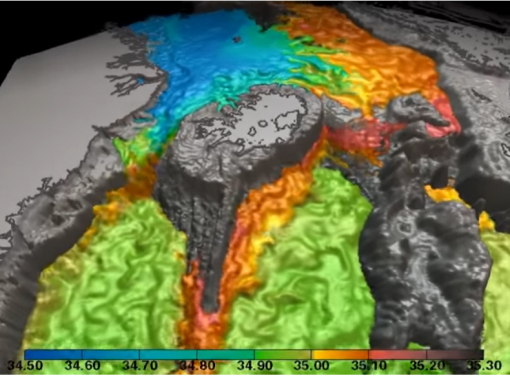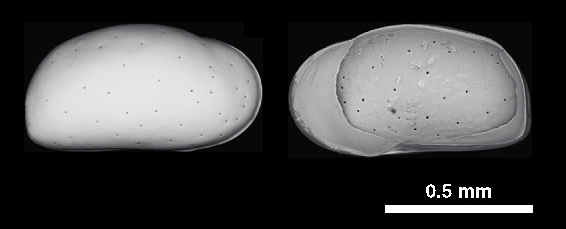傳媒
HKU Earth Scientists Discovered Century-scale Deep-water Circulation Dynamics in the North Atlantic Ocean throughout the last 20,000 years (English only)
2019年05月15日

Image 1: Atlantic meridional overturning circulation. Image credit: NASA/Goddard Space Flight Center Scientific Visualization Studio (http://svs.gsfc.nasa.gov/3884)
Dr Moriaki Yasuhara, Dr Hisayo Okahashi, and Dr Huai-Hsuan May Huang from School of Biological Sciences and Swire Institute of Marine Science of The University of Hong Kong (HKU), in collaboration with scientists in Lamont-Doherty Earth Observatory of Columbia University, Duke University, and US Geological Survey have recently reported their discovery on a key driver of past and perhaps future abrupt climate change that is deep-water dynamics in the North Atlantic Ocean in the journal Geology.
Since the proposal of “conveyor belt” paradigm by Wallace S Broecker, in 1980s, the deep ocean circulation, now known as the Atlantic Meridional Overturning Circulation (AMOC), has been widely regarded as an important driver of global climate changes. The AMOC is a process that cold and salty surface water sinks into deep ocean in the high-latitude North Atlantic Ocean, the lower limb deep water (known as North Atlantic Deep Water: NADW) flows southward (Image 1), and eventually upwells to the surface in the North Pacific Ocean. The strength of this circulation is known to affect global heat flow and regional climates. To study this circulation dynamics, the North Atlantic Ocean is especially important, because it is the place that deep water is formed through cooling surface water in the high latitude.
The lower (deeper) part of NADW below 2,500 meters is well studied, but upper NADW (intermediate water) behavior is poorly understood for the last deglaciation, that is, the transitional period from the last ice age to the warmer contemporary interglacial climate state. Furthermore, NADW dynamics for the past ~11,700 years (known as the Holocene) remain equivocal. Dr Yasuhara and his collaborators showed that subtropical North Atlantic intermediate-water temperature varied significantly during both of these time periods, based on trace element geochemistry of calcified shells of deep-sea microcrustacean Ostracoda in a sediment core (Image 2). Their reconstructions reveal a series of multi-century-scale abrupt deep-water warming events likely caused by the reduction deep-water circulation. The authors also discovered that many of these weakening events of deep-water circulation can be widely recognized in the western North Atlantic. These deglacial–Holocene deep-water-circulation dynamics are important for understanding present and future trends in Earth's climatic system because warming and resulting polar-ice melt can change the deep-water circulation. Recent United Nations IPBES (The Intergovernmental Science-Policy Platform on Biodiversity and Ecosystem Services) report indicated that ~1 million species are now are threatened with extinction (https://www.ipbes.net/news/ipbes-global-assessment-summary-policymakers-pdf), changes in Earth's climatic system is an important part of the reason of this.
Lead author of the study Dr Yasuhara said "Holocene deep-water circulation was more dynamic than previously thought. There is increasing evidence that this circulation change in the North Atlantic affects climates of remote places including East Asia and also marine and terrestrial ecosystems. As recently discovered by scientists including my HKU colleagues Drs Benoit Thibodeau and Christelle Not, this global deep-water circulation has substantially weakened during the last century1. If further weakening happened in the future, there may be unexpectedly broad implications not only on our atomospheric and ocean systems but also on Earth's ecological systems and our society".
“Quantifying the intensity of North Atlantic Circulation in the past is one of the grand challenge of our field. In order to better understand the magnitude and significance of the 20th century weakening trend in the circulation1 we need more reconstruction of its intensity in the past, like the one provided by the study of Dr Yasuhara and colleagues.” mentioned Dr. Thibodeau in the Department of Earth Sciences, HKU.
For media enquiries, please contact Ms Cindy Chan, Assistant Director of Communications, HKU Faculty of Science (tel: 3917 5286/ 6703 0212; email: [email protected]) or Dr Moriaki Yasuhara, Associate Professor of School of Biological Sciences at [email protected].
About the Research Paper
Journal: Geology
Title: North Atlantic intermediate water variability over the past 20,000 years
Authors: Moriaki Yasuhara (The University of Hong Kong), Peter B. deMenocal (Lamont-Doherty Earth Observatory of Columbia University), Gary S. Dwyer (Duke University), Thomas M. Cronin (US Geological Survey), Hisayo Okahashi (The University of Hong Kong), and Huai-Hsuan May Huang (The University of Hong Kong)
Link of the research paper: https://doi.org/10.1130/G46161.1
1Supplemental reading: Last century warming over the Canadian Atlantic shelves linked to weak Atlantic Meridional Overturning circulation. Thibodeau B, Not C, Zhu, J, A Schmittner, D Noone, C Tabor, J Zhang & Z Liu, Geophysical Research Letters, 45 (22), 12376-12385. https://doi.org/10.1029/2018GL080083
youtube movie: https://www.youtube.com/watch?v=9kXsBux13qo
Images download: https://www.scifac.hku.hk/press


